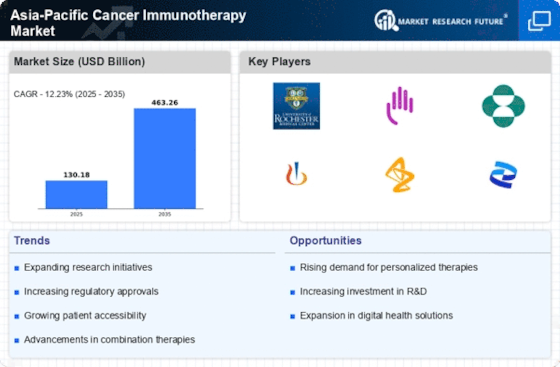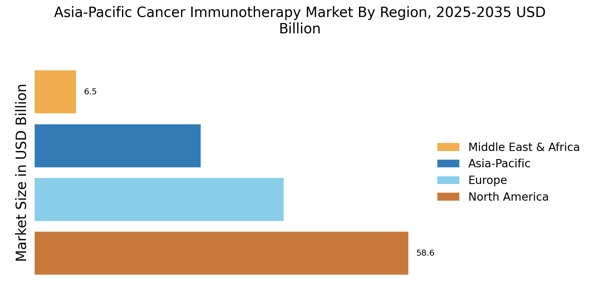Rising Cancer Incidence
The Asia-Pacific Cancer Immunotherapy Market is experiencing a surge in demand due to the increasing incidence of cancer across the region. According to recent statistics, cancer cases in Asia-Pacific are projected to rise significantly, with estimates suggesting that by 2025, the number of new cancer cases could exceed 5 million annually. This alarming trend is driving healthcare systems to seek innovative treatment options, including immunotherapy, which has shown promising results in various cancer types. The growing awareness of cancer prevention and treatment options is further propelling the market, as patients and healthcare providers alike are increasingly inclined to explore advanced therapies that offer improved outcomes. As a result, the Asia-Pacific Cancer Immunotherapy Market is poised for substantial growth, reflecting the urgent need for effective cancer management solutions.
Increasing Healthcare Expenditure
The Asia-Pacific Cancer Immunotherapy Market is benefiting from rising healthcare expenditure across various countries in the region. Governments and private sectors are increasingly allocating funds to enhance healthcare infrastructure and improve access to advanced treatment options. For instance, countries like Japan and Australia have reported significant increases in healthcare budgets, with projections indicating a growth rate of 5% annually through 2025. This financial commitment is facilitating the adoption of cutting-edge therapies, including immunotherapy, which often require substantial investment. As healthcare systems strive to provide better cancer care, the Asia-Pacific Cancer Immunotherapy Market is likely to experience accelerated growth, driven by enhanced funding and resource allocation for innovative treatment modalities.
Regulatory Support for Immunotherapy
Regulatory bodies in the Asia-Pacific region are increasingly supportive of the development and approval of immunotherapy treatments, which is a key driver for the Asia-Pacific Cancer Immunotherapy Market. Streamlined approval processes and favorable regulatory frameworks are facilitating quicker access to innovative therapies. For example, the recent introduction of expedited review pathways for breakthrough therapies has significantly reduced the time required for new immunotherapeutic agents to reach the market. This regulatory environment not only encourages pharmaceutical companies to invest in research and development but also enhances patient access to potentially life-saving treatments. As regulatory support continues to strengthen, the Asia-Pacific Cancer Immunotherapy Market is expected to expand, reflecting the growing commitment to advancing cancer care.
Growing Patient Awareness and Advocacy
Patient awareness and advocacy are crucial drivers of the Asia-Pacific Cancer Immunotherapy Market. As more individuals become informed about cancer treatment options, there is a noticeable shift towards seeking advanced therapies like immunotherapy. Advocacy groups are playing a significant role in educating patients about the benefits and availability of these treatments, leading to increased demand. Surveys indicate that over 60% of patients are now aware of immunotherapy as a viable treatment option, compared to just 30% five years ago. This heightened awareness is encouraging healthcare providers to incorporate immunotherapy into treatment plans, thereby expanding the market. The Asia-Pacific Cancer Immunotherapy Market is likely to thrive as patient engagement continues to rise, fostering a more informed patient population.
Technological Advancements in Immunotherapy
Technological innovations are playing a pivotal role in shaping the Asia-Pacific Cancer Immunotherapy Market. The development of novel immunotherapeutic agents, such as monoclonal antibodies and CAR T-cell therapies, has revolutionized cancer treatment paradigms. Recent advancements in biomarker identification and genomic profiling are enabling more precise targeting of therapies, enhancing their efficacy and safety. The market is witnessing a notable increase in research and development investments, with funding for immunotherapy projects reaching approximately USD 10 billion in 2025. These technological breakthroughs not only improve patient outcomes but also expand the range of treatable cancers, thereby driving the growth of the Asia-Pacific Cancer Immunotherapy Market. As these innovations continue to evolve, they are likely to attract further interest from both investors and healthcare providers.

















